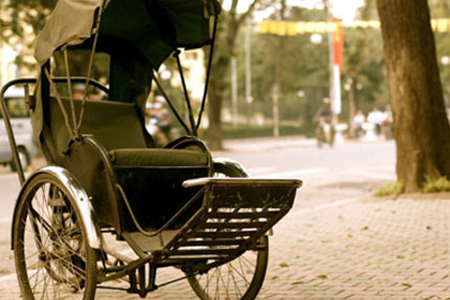We are going out of town. A fine drizzle is falling on the plastic hood of the pedicab. It will be half an hour before we arrive at our destination, the home of a friend of mine who lives with his wife in a suburban village. I engage in small talk with the driver perched on his seat behind my back.
He is a thin man about fifty, with rugged face tinged with a kind of bitterness. A certain stiffness in his demeanor smacks of a military past. In fact he eventually tells me that he is a retired army lieutenant. The case of Mr Hanh, the cyclo driver, is fairly typical of the life of a soldier in the North Vietnamese army in the American war. Of peasant stock, he was born in An Hung village, for a year now made a part of the port city of Haiphong. When he was eight, while going to primary school, he served at the same time as an apprentice to a tailor, his own uncle. In 1950, in the thick of the First Indochina War, Haiphong was occupied by French troops. Little Hanh, then aged 12, earned his living doing piece work for the army's supply department. In 1954, the city was liberated together with the whole of North Vietnam. Hanh got jobs with privately-run shops. At the age of twenty, he married a peasant girl of 16. In 1961, he joined the army and was to stay with it until 1972. He was first destined for service with the navy, then the air force, then at his request, with the paratroops. Finally, after six months’ training, he became a truck driver. Under US air bombings he carried munitions on the famous Ho Chi Minh trail. In 1967 fighting raged on Highway 9 near the 17th parallel B 52s carried out carpet bombings night and day. Toxic chemical sprayings laid waste the virgin forests and exposed the Ho Chi Minh trail. As a political commissar supervising a 124-truck battalion. Hanh took direct command of 12 trucks whose drivers had volunteered to carry new DKB rockets to Tan Canh in Quang Tri province. Several times he escaped death by a hair's breadth He fulfilled brilliantly his assignment and was awarded a medal of Liberation Fighter.But when it was being regrouped, his battalion was decimated by B.52s.
"Rare are the buddies I have had occasion to meet," said Hanh, pedalling away.
He himself was wounded: a bomb splinter in the bad part of his skull and pellets from a CBU in his armpit. He underwent six month's treatment, but the doctor could not take out all the pellets. One of them is still inside his body, slowly moving from place to place and is now somewhere in his belly.
"It doesn't make me suffer", he said, "but is nonetheless a nuisance".
We offer variety of service related to Tours to Vietnam, Tours to Hanoi or Ho Chi Minh Tours click in to the link to view more
Because of the shortage of experienced cadres, Hanh went with the truck convoys until he was demobbed in 1972. In civilian life, he worked in a shop making artificial limbs for the amputated people.
As a joiner, he sharped heels, thighs, arms, hands... all in wood, plastics being in still little use. In 1976, as an invalid, he enjoyed the right to premature retirement.
His family has not been a happy one. When he left the army, he found that his wife has deserted him. His first child, a son, now lives from odd jobs in Germany. His second child, also a son, got implicated in a criminal offence. His daughter has not been happily married. Himself got married to retired State employee. They combined pensions can hardly make ends meet. They have a baby boy, now in his first year, and live in a dilapidated hut. That is why he bees to drive a pedicab to eke out a supplement of income.
Travel guides give this advice: "Pedicabs can be found at every street corner in Vietnam and are the most practical means of urban transport." How many foreign tourists have any interest in the fate of those driving them across town?
There are in Hanoi, probably, thousands of pedicab drivers. The bulk is made up of professionals and peasants coming from Nam Ha and Thanh Hoa in pre-harvest months. To them are added a small number of State employees, students and even intellectuals seeking on extra income. This is a sign of the times, for in traditional society no self-respecting man would stoop to this occupation, especially in the days when the vehicle was a rickshaw. The man pulling a rickshaw, called "coolie-pousse" by the colonists and mandarins, was classed together with prostitutes at the bottom of the social ladder. In the first days of the 1945 revolution, the city administration put a ban on pedicabs, which were deemed contrary to human dignity, thus depriving thousands of people of a livelihood. In the last decease, it has come back to a more realistic policy, particularly in the face of urban population explosion following the onset of the market economy.



